

How to Prepare for a Recording Session - Recording on a budget

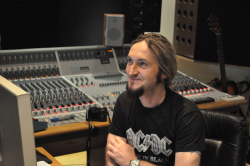
The most important thing to remember in this process is that any recording studio is a very expensive rehearsal room, so it is absolutely paramount to be prepared.
Preparation is the name of the game. I have had bands come in and lay down 10 tracks in a day (excluding mixing of course)
Preparation comprises four elements
- You
- The song - arrangement - key - tempo
- Your instrument
- The band
You
Make sure you know the song chords and lyrics. Obvious? You may think so but you'd be amazed how many don't. Are you playing within your limits? It's very tempting to get carried away by the moment and try a part that's right on the limit of you playing ability. Occasionally this can be a good thing for example in a solo, making a part sound more "on the edge" and "angst" but exceptions aside it's often far better to stay in the "comfort zone". Playing often sounds more relaxed and slick.
The Song
Be sure to have the arrangement finalized as well as the key and the tempo. Be sure to have a list of all equipment over dubs that you require. Make sure you have the song lyrics finished! Think about harmonies you might want. You don't necessarily have to know the part, just whether you want them or not.
Your Instrument
Make sure your instrument is in tip top condition. The usual culprits are worn out drum skins, old guitar strings, guitar intonation, dodgy action, dodgy reeds, broken keys. These are all things that can ruin an otherwise great session and in financial scale of things cost pence to fix. The other plus is that if you have suffered a gradually worsening instrument condition, when you come to play it after a long overdue set up, it's often like turbo charging your playing and can be very invigorating.
Two common problems with electric guitars (6 string and bass) is bad connections on the jack input sockets and crackly volume and tone pots. Again these things can waste so much time in the studio, ruin good recording takes and soon make that guitar set up you decided not to bother with seem like really good value for money after all.
Then there's the bane of my life. Amp valves! Get them checked out or replaced or bring some spares with you. It's good practice to carry spares valves with you anyway.
The Band
It's imperative that all the band are equally comfortable with the material and are gelling as a band. Some candidness between band members helps here and it's important to leave ego's out of the rehearsal room. It's often much easier to see others mistakes than your own. I guess that's why sportsmen and women have coaches.
Record Your Rehearsals - The Dreaded Rewind Button
This is a really essential part of your preparation. That rewind button does not lie. I always liken it to leaving a greeting message on your answer phone. You play it back in horror and think "I don't sound like that", when actually, you do!
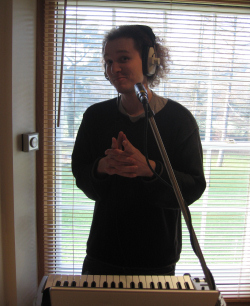
Many rehearsal studios nowadays have basic recording studio facilities for this reason and perform a really vital pre-production role in this respect. Playback will help you hear timing or pitching inaccuracies. It also gives you the chance to reflect on the strengths and weaknesses of tracks (or players!) and really helps with song selection, unless you are going to record all your tracks. The quality of this recording is not important. Any kind of recording device will do even a camcorder will suffice.
Your rehearsal recordings make very useful demos for your studio engineer or producer and will help you decide whether to work to a click track. I would recommend taking advice from the recording studio staff with regard to click tracks.
Depending on the style of music and the timing strengths of the players click tracks can be as big a hindrance as a help. If the band aren't use to playing to them or the tracks are better suited to timing shifts through different sections of the songs then click tracks can be a problem and can kill the groove of a track. One option of course is to program a click track but this is best decided with the studio engineer before the recording session, hence the benefit of the rehearsal recordings.
If you do decide to use click tracks it's imperative to practice using them. All band members should practice this as matter of course and not just for the recording session. I'm all for track tempos being allowed to "breathe" but it's better when it's a conscious decision rather than a mistake. Practising to click tracks should be a regular individual exercise. Class players all have one thing in common, impeccable timing.
Ticking all these boxes above is important given the level of investment of your precious disposable income.
The final ingredient in preparing for your session is to get a good night's sleep (knowing that you're well prepared will help with this). It’s very hard to get a good performance if you’re tired or run down. For singers it is really important to wake sufficiently early in the day so that you're voice has fully "woken up" by the time you come to singing.
The normal high quality of the songs will be lacking because of a poor performance by you and this will waste a lot of time and the band’s money. Try to book a block of sessions on a weekend or during a holiday from work so that you don’t have to do a full days work before hitting the recording studio. During the studio session take short but regular breaks, especially if you’re the vocalist. You may think that this is wasting precious time but having three attempts at recording one song because you’re concentration is wandering or your voice is suffering will work out to be a much bigger waste of time. Also realise when it is time to call it a day; trying to produce music when you’re tired, both mentally and physically, can do more harm than good.
The Session Itself
OK so you're excited, after all, today is the day that you make musical history! A few nerves can be constructive but It is imperative that you relax. Knowing you're in good hands can help with this of course and hopefully your discussions with and reassurances from the recording studio staff, will have confirmed your studio choice is the right one. Many studio engineers are also players and it's important to keep an open mind and listen to any advice they give. If they're "worth their salt" they will be able to do this in a diplomatic and reassuring way that you won't find intrusive.
Don't skimp on set up time. This is the most important part, particularly when it comes to drums. The next time you hear a poor demo I'll bet you the weakest link is the drum sound and the weakest part of the drum sound is usually the snare.
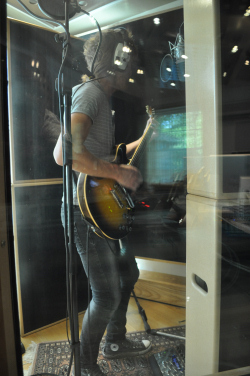
Drum sound can be tricky to get right, the important thing to remember is that a good drum sound is a happy marriage of a good playing technique and (vitally) a reasonable quality, well tuned, freshly skinned drum kit. This does not mean you have to be an amazing drummer, but that you execute your part well and accurately and emphasizes the need to stay in that "comfort zone" I mentioned earlier. Consistency in the placement and strength of drum strokes is the name of the game here, avoiding the dead spots (usually found dead centre of the drum heads), accidental rim shots or miss-hit cymbals.
If the drums don't sound good going down it will be very difficult to "fix in the mix" and it's the engineers job to at least identify this problem, if not to fix it. After all he may be at the mercy of a sub-standard drum kit.
Ten21 recording studio pride themselves in their drum sounds and is why we have our own high quality in house drum kits with a comprehensive selection of snare drums and drum heads and more importantly the expertise to dial in a great drum sound quickly.
Equally important is to spend the time on the guitars, keyboards and other instruments. A good sound leads to a good vibe. At Ten21 recording studio we never skimp on set up time. At the end of the day it can take as little a few minutes to lay down a great sounding performance, but it can take hours to try and fix it later if it doesn't!
When you have recorded a few good passes and return to the control room for evaluation, don't listen at loud volume and ask the engineer to mute any reverbs on vocals or guitars. Pitching problems are much easier to identify at low volume (as are distorted signals) and if your monitor mix sounds great "dry" and at low volume, then you're onto a winner.
Always make sure you have more tracks rehearsed than you are intending to record. There are a number of important reasons for this.
It's not unusual if you're well rehearsed to lay down your quota of tracks more quickly than anticipated. Given that your set up time is not only a considerable investment but also a fixed cost it's best to use up any saved time recording more tracks.
Even if you don't have sufficient funds to mix these additional tracks you still have them recorded and backed up for mixing in the future when funds permit. The added benefit is in the fact sometimes a particular track you considered to be your star track, doesn't turn out the way you'd hoped and you have the option of substituting it for one of these additional tracks that may have turned out better than you'd expected.
Playing Tips
Timing! It seems to be a human instinct to speed up no matter what instrument you're playing. It is imperative to be relaxed in the recording session (hence the preparation) and remember that it's not a race to get to the end of the song. Early tends to be out of time, late tends to be groove.
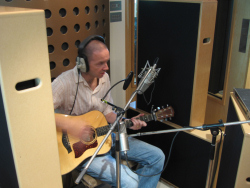
Never let an individual mistake ruin a good take. If it is such a big mistake as to ruin a "take" the engineer would stop the take and rerun. Invariably though, fixing a few mistakes on individual instruments is really quick and easy to fix by punching in later (provided of course that spill between instruments isn't too much of a problem). While the rest of the guys are making the coffee you'll probable have the problem fixed so don't panic. If you do make a mistake gather your thoughts and pick up your part as soon as you can without putting off the rest of the band who may still be delivering a "steaming" performance.
Guitarists, tensing up in a take usually makes you over grip the chords which can push some of your chords sharp. Correct intonation will help highlight when you're doing this. Once again relaxing is the name of the game. Think about pick weight. Sometimes the reason for finding a part difficult can be down to the wrong pick weight. Don't forget to keep checking your tuning. It can drift in just one take.
Keyboard players. For some reason it's a common trait that keyboard players tend to be a little "racy" with the pace. If you know this to be you, I recommend relaxing and think "lazy" with your timing. Remember early is out of time, late is groove, and when you think you've relaxed, relax again! Have your sounds ready to call up quickly between songs. The problem with the more modern keyboards is the sheer number of sounds available and it's really easy to waste time trying to find the right one.
Take your manuals with you. This may seem excessive but the number of times I have struggled to find out how to turn off the reverb from a sound so as to record it dry. This is important as you can't take it off but you can easily add it to taste at the mix stage.
Drummers. Don't be obsessed by the click remember it's only a guide and won't be in the mix. If you go out with the click don't over correct (this is where practice helps). Try to drift back in with the click. Gradual tempo drifts will probably not be detectable when the click is out, where as dramatic over-corrections will. Don't have the click track too loud, the quieter it is, the more you will be able to live with it in a 'take' and I recall Simon Phillips' preference in one of his videos for the click to be barely audible in the mix, so that he could only just hear it if he went out of time.
Bass Players. You are the bridge between the music and the rhythm. Don't assume timing is the responsibility of the drummer. It's your joint responsibility. If you and the drummer lock in tight the band should "rock". Your practice with click tracks is also vital.
Singers. Don't have your monitor too loud or if you do be aware that it can affect your pitching so listen carefully to the playback to see if you have gone sharp or flat. Your engineer will probably be able to tell you. Start each take as if it's "the one" but as soon as you feel that it's not and the band will probably want to go again then lay back on your vocal and keep some in reserve. It's easy to run out of steam in a recording session. Remember if you're planning to do say six or seven songs and need say 5 passes on average for each song, that's 30 or so songs you're going to sing and you need to keep something in reserve.
All players should be aware of the detuning (even drummers) and check their tuning between takes to avoid losing a great take.
Simple errors for everyone to avoid.
Try not to move or displace microphones. In most cases they are pretty hardy beasts so from that point of view it's not usually a problem, but moving a mic can affect the sound of an instrument dramatically. If you do, be sure to tell the engineer so he can replace the mic to it's correct position.
At the end of a track, let the your final chords decay naturally (unless of course a muted chord is the desired effect). Don't start chatting to each other until they have faded sufficiently. The engineer can do a much better job of fade with all the gear at his disposal than you will with your guitar pot.
If you're not happy with your headphone mix (or anything else for that matter) for heavens sake, tell the engineer. At the end of the day he can't fix a problem he doesn't know about.
Finally...
Always remember to bring extra sets of strings, drum sticks, spare snare drum skins, batteries, fuses (eg internal fuses typically found inside guitar amps), amp valves, any files that may need to be imported, and of course lyric sheets (useful for the engineer).
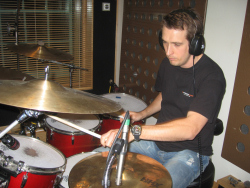
Consider also parking availability and cost, food and drink, and if required accommodation. Equipment hire should also be considered if necessary but this should be discussed at early stages of planning with the studio.
Change strings and skins the night before and make sure you stretch them in properly.
If you run over on time and have to skimp anywhere, skimp on the mixing.
With the total recall that technology permits nowadays you can always come back and remix when budget permits picking up from where you left off, with a minimum redundant time spent setting up the mix.
Lastly when it comes to back ups I recommend to my clients that they invest in an external USB hard drive, which we are happy to supply at cost. This serves as a medium for incremental back ups as the session progresses and your final backup drive. The justification for this is that the cost of the drives are so cheap now that it's cheaper for the client and of course makes for easy secondary DVD back up which they can do at home. File format should really be broadcast wave which is a professional time stamped format and is pretty much the de facto standard nowadays.

